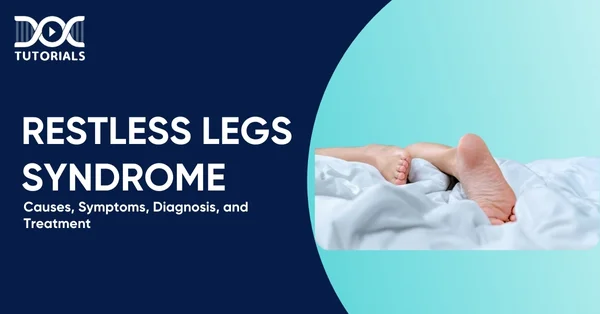Restless Legs Syndrome | Causes, Symptoms, Diagnosis, and Treatment

Restless legs syndrome (RLS) is a neurological disorder characterised by an overwhelming urge to move your legs. It often occurs in the evening or at night, making it difficult for people to sleep or relax. RLS makes life worse by making it hard to sleep and making you tired. Managing the symptoms well is possible with early diagnosis and therapy.
If you’re a medical student getting ready for the NEET PG test, you need to know what causes, symptoms, diagnosis, and treatment options are for restless legs syndrome. This blog provides a comprehensive overview of restless leg syndrome, including its causes, exacerbating factors, and effective management strategies.
Read on for more information on RLS.
What Does It Mean to Have Restless Legs Syndrome?
People with restless leg syndrome often feel the urge to move their legs frequently. It often makes you feel uncomfortable, such as tingling, crawling, or itching, especially when you’re resting or doing nothing. At night, the sensations typically worsen, making it difficult to fall asleep. Engaging in activities like walking or stretching can help alleviate the pain for a short time.
It can affect one or both legs and, in certain circumstances, the arms. We don’t know what causes this disease, although it appears to be linked to the brain chemical dopamine, which helps regulate muscle movement.
What Causes Restless Legs Syndrome?
It’s not clear what exactly causes restless legs syndrome (RLS). However, several factors are believed to influence the illness, particularly brain chemistry and nerve function. RLS can happen on its own (primary) or require another health problem to happen (secondary).
Some of the possible or known reasons are:
- Dopamine Imbalance: If the brain’s dopamine levels are low, it may make it harder to control movement, which might cause symptoms.
- Iron Deficiency: RLS is strongly linked to low iron levels in the brain, even when blood iron levels appear normal.
- Chronic Diseases: Diseases like diabetes, kidney failure, and Parkinson’s disease can make restless leg syndrome worse or start it.
- Pregnancy: Changes in hormones during the third trimester might cause transitory RLS symptoms that usually go away after giving birth.
- Neuropathy: Damage to nerves, particularly in the legs, can exacerbate RLS symptoms.
What are the Things That Make You More Likely to Get Restless Legs Syndrome?
There are several factors that can increase the likelihood of someone developing restless leg syndrome. These include health conditions, drugs, and even family history.
Some common risk factors are:
- Iron Deficiency: Not having enough iron in the brain can make you feel restless.
- Chronic Diseases: People with diabetes, kidney failure, or Parkinson’s disease may have restless legs syndrome.
- Pregnancy: Changes in hormones during pregnancy, especially in the latter three months, might cause temporary rest leg syndrome.
- Some medications, like antidepressants, antihistamines, and antipsychotics, may make symptoms worse.
- Family History: You may be more likely to get restless leg syndrome if a close family member has it.
- Age and Gender: Older individuals are more likely to contract it, while women are more susceptible to it.
What is the Diagnosis for Restless Legs Syndrome?
There isn’t just one test that can prove you have restless leg syndrome. Doctors typically assess a patient’s symptoms and medical history. A pattern of signs and symptoms, along with their frequency, helps doctors make a diagnosis. Doctors may also look for other problems that could produce the same symptoms.
Some of the usual ways to diagnose are:
- Review of Symptoms: The doctor will ask about how your legs feel, when they hurt, and how moving helps.
- Review of Medical History: The patient’s overall health, sleep habits, and family medical history are examined.
- Physical Examination: This helps rule out nerve or muscle problems that can look like restless legs syndrome.
- Blood tests are used to detect iron deficiencies, kidney issues, or other underlying conditions that may be causing the symptoms.
- Sleep Study (if needed): To rule out other sleep problems, including sleep apnea, doctors may sometimes suggest a sleep test.
Early diagnosis can help initiate therapy promptly and prevent symptoms from worsening over time.
What Are the Many Ways to Treat Restless Legs Syndrome?
The goal of treatment for restless leg syndrome is to ease symptoms and help you sleep better. The method may vary depending on the severity of the problem and its underlying cause.
Here are some lifestyle adjustments and home cures that work:
- Exercise regularly: Engaging in light exercise can help alleviate symptoms.
- Good sleep habits: Following a regular sleep pattern and engaging in a soothing activity before bed can help you sleep better.
- Avoiding triggers can assist. For example, cutting less on caffeine, alcohol, and smoke can help.
- Hot and cold therapy: Taking a warm bath or using a cold compress may help with pain.
- Stretching and massaging your legs can help you feel better before bed.
Some more common medical procedures are:
- Iron Supplements: If you don’t get enough iron, supplements may help with your symptoms.
- Dopamine Agonists: These medications are often prescribed to help control movement disorders.
- Medicines to stop seizures: Gabapentin and pregabalin can help with nerve pain and other types of pain.
- Sleep Aids: Sometimes, drugs like benzodiazepines are only used for a brief time.
- Opioids are only used in really bad situations that don’t respond to other treatments, since they can lead to addiction.
FAQs About Restless Legs Syndrome
- When should someone with restless legs syndrome talk to a doctor?
If symptoms don’t go away or get worse over time, it’s crucial to see a doctor. People should consult a doctor if home treatments don’t work, if their symptoms make it hard to do everyday things or get a good night’s sleep, or if the pain gets worse.
- Is restless legs syndrome a bad thing?
People with restless legs syndrome don’t have to worry about their lives, but it can make their lives a lot worse. The condition typically causes problems with sleep, fatigue, and emotional distress. Because it can affect sleep and daily life for a long time, it’s best to see a doctor.
- What do doctors do to help people with restless legs syndrome?
People with mild restless leg syndrome can control it by making modifications to their daily lives, such as avoiding caffeine, getting enough sleep, and taking warm baths. Severe instances may need drugs that work on dopamine or iron supplements.
- Do you know of any quick ways to help with restless legs?
Moving your legs, stretching, taking a warm bath, or getting a massage will help right away. It also helps to avoid things that trigger your reactions, such as caffeine.
- Does restless legs syndrome ever go away by itself?
Some people may find that their symptoms go away, but restless legs syndrome is a long-term illness that needs continuing care for many.
Conclusion
People often misdiagnose restless leg syndrome. It is a neurological disorder that has a significant impact on sleep and overall health. People can reclaim control and enhance their quality of life by recognising the signs of restlessness, understanding its causes, and seeking the right therapy.
Simple modifications to your lifestyle or medical treatment can help alleviate restless leg syndrome symptoms. People who are impacted can live pleasant and tranquil lives with the correct help and care.
We provide students with extensive NEET PG study resources on various vital topics at DocTutorials. Our structured method and professional coaching help students get a solid understanding of the medical field.
Sign up for our course immediately and do well on the NEET PG test!
Latest Blogs
-

NEET SS Exam 2024: Analysis, Key Dates, Counselling
The NEET SS 2024 exam kicked off on March 29, 2025. Over two days and two slots, candidates across 13…
-

NEET PG Registration 2025: An Essential Guide For Exam Prep
The NEET PG registration, which is conducted online, is a crucial step in the exam process. Filling out the NEET…
-

NEET PG Syllabus 2026: A Must-Have Complete Guide for Exam Success
The NEET PG Syllabus acts as one of the foundation stones for aspiring postgraduate medical students like you who are…




